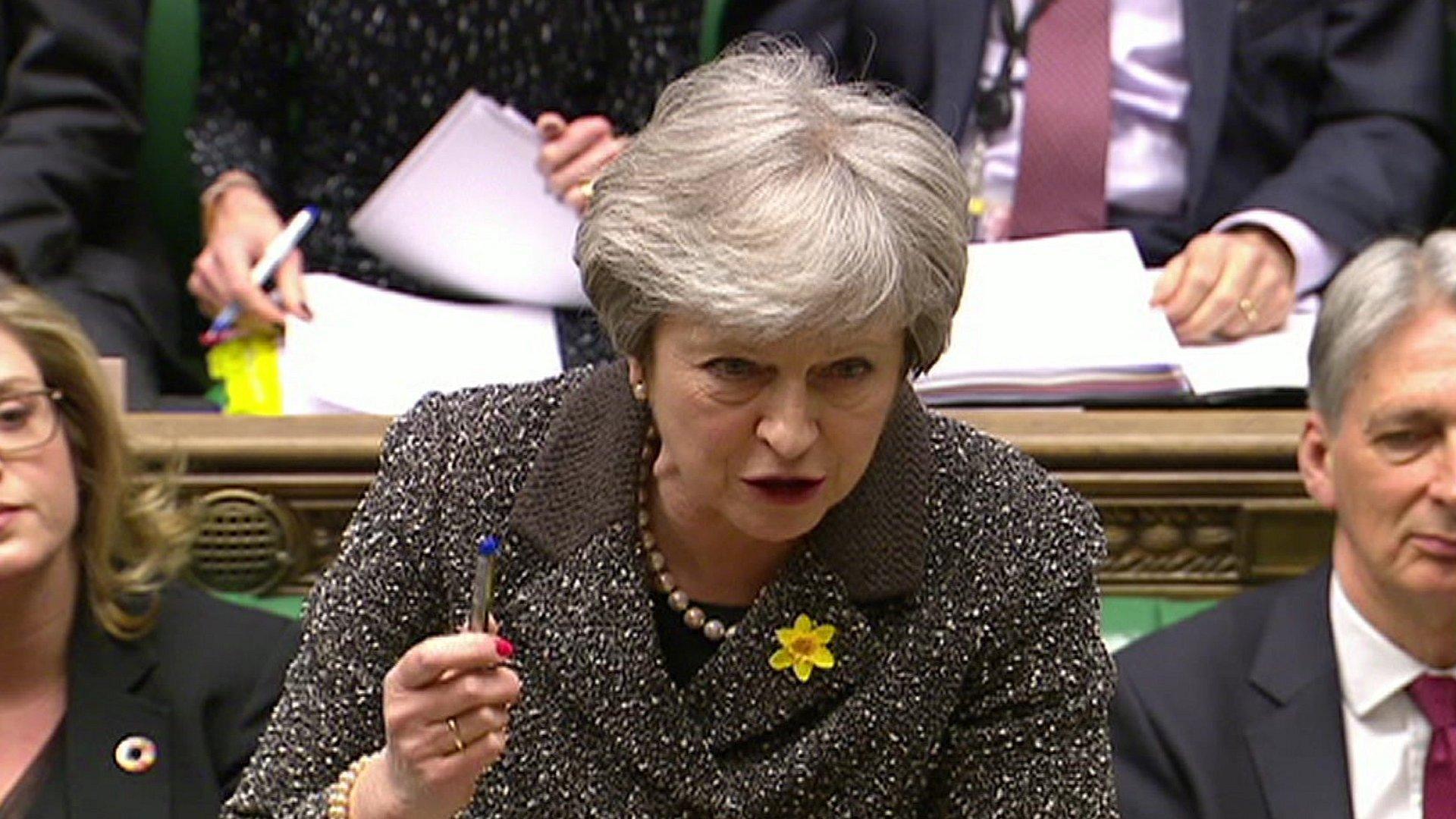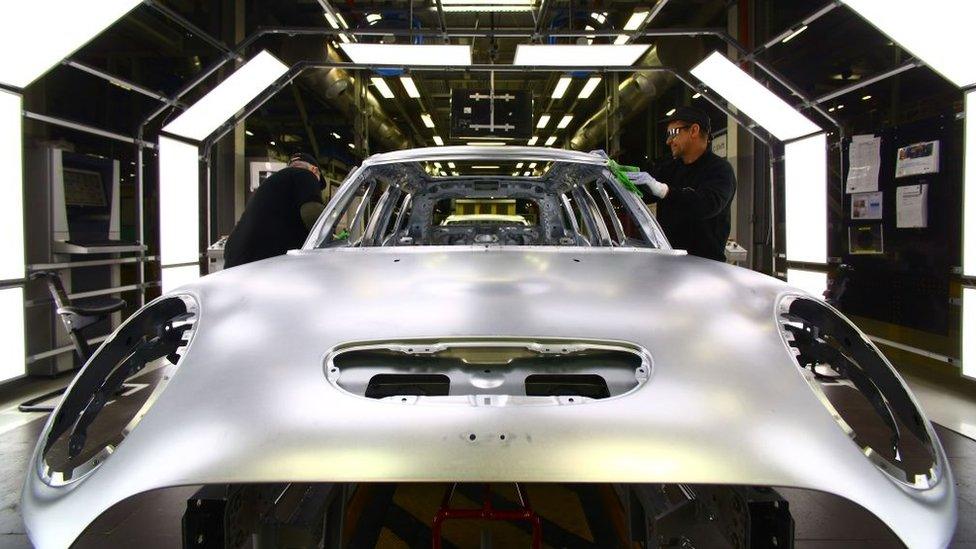Donald Tusk asks UK for 'better' Northern Ireland idea
- Published
- comments
Donald Tusk joked that his journey was 'not frictionless'
Donald Tusk has said Theresa May needs to come up with "a better idea" than the EU's controversial plan to prevent a hard border in Northern Ireland.
The PM has rejected keeping Northern Ireland in the EU's customs area saying this would split the UK in two.
But the European Council president said one of the "possible negative consequences" of the kind of Brexit Mrs May wants would be a hard border.
The two met in No 10 ahead of a big Brexit speech on Friday by Mrs May.
Mrs May, who chaired a meeting of the cabinet before her talks with Mr Tusk, has already pledged not to accept the draft withdrawal treaty published on Wednesday by the EU.
She reiterated this position to Mr Tusk during what Downing Street said was a "positive and constructive meeting".
The prime minister wants to resolve the Northern Ireland question "through the overall relationship between the UK and the EU", Downing Street said.
An EU source said the main focus had been the nature of the UK and EU's future relationship and that all the EU's remaining members supported its chief negotiator Michel Barnier.
'Constitutional integrity'
The UK and the EU agree on wanting to avoid a return to a physical border - with border posts and checks - in Northern Ireland.
The UK has suggested new IT systems could be introduced to avoid the need for physical border checks but has yet to spell out how this would work in practice.
But the draft EU treaty also includes the option of a "common regulatory area" after Brexit on the island of Ireland - in effect keeping Northern Ireland in a customs union - if no other solution is found.
Both the EU and the Irish government say it is up to the UK to come up with concrete alternatives to what they describe as a "backstop" option.
Tony Blair tells Today people are "sacrificing peace in Northern Ireland on the altar of Brexit"
Mrs May says the EU proposal would "threaten the constitutional integrity of the UK" by creating a border down the Irish Sea.
In a speech in Brussels before travelling to London Mr Tusk said he was "absolutely sure that all the essential elements of the draft" would be accepted by the 27 remaining EU members.
And he said Mrs May's decision to rule out membership of the single market and customs union had been acknowledged "without enthusiasm and without satisfaction".
The PM has said she wants a deal which will allow trade to be "as frictionless as possible".
But Mr Tusk warned: "There can be no frictionless trade outside of the customs union and the single market. Friction is an inevitable side-effect of Brexit by nature."
'Benefits of sticking together'
Mr Barnier has also been addressing the issue in a speech at the business conference in Brussels.
As a result of the UK's stated negotiation red lines, he said, the only option remaining was a free trade agreement in the vein of the deals the EU already has with other third countries.
He dismissed hopes of a "mutual recognition" arrangement on trade standards, saying this was impossible because of the UK's refusal to accept European Court of Justice oversight.
And in a message to other EU leaders, he said the "economic benefits of staying together" were "far bigger" than any negative knock-on impact from Brexit.
Mr Barnier also said Northern Ireland was a "sensitive" issue and that the problem was down to the UK's decision to leave the single market and customs union.
The EU will look at UK proposals "in a very constructive way", he said, adding: "Any vision of the future must take into account the fact that the EU cannot and will not compromise on its founding principles."
Irish senator Neale Richmond, European affairs spokesman for the Fine Gael party that leads the government, said Britain has provided "zero detail" on its proposed alternatives to keeping Northern Ireland in a customs area with the EU to avoid a hard border with the Republic of Ireland.
May: I'll make opposition to plans 'crystal clear' to EU
Veteran Eurosceptic Sir Bill Cash told the BBC's Newsnight there were "technical ways" of managing the Irish border and accused the EU of trying to create a "constitutional crisis" for the UK.
Cabinet ministers have suggested Friday's speech by Mrs May will give the EU the clarity that it has been seeking about what kind of trade relationship the UK wants after its departure on 29 March 2019.
In an apparent concession to the EU ahead of the speech, the government said EU nationals coming to the UK during a transition period after Brexit, expected to last two years, would be able to apply for indefinite leave to remain.
Mrs May has said her long-term goal is a "bespoke economic partnership", underpinned by a comprehensive free trade agreement guaranteeing tariff-free access to EU markets for British goods and services.
EU's Michel Barnier: I'm not trying to provoke anyone
Earlier former prime minister Tony Blair urged the EU to put forward new ideas to address "genuine underlying grievances beneath the Brexit vote, especially around immigration" - saying this could lead voters to change their minds on leaving.
In a new report, the Commons Business Committee warned failure to reach any kind of deal would be damaging for the car industry and only close alignment with the EU would ensure its survival.
But on Tuesday the industry received a vote of confidence when Toyota said it would build the next generation of its Auris hatchback at its Burnaston plant in Derbyshire, safeguarding more than 3,000 jobs.
- Published28 February 2018

- Published1 March 2018
